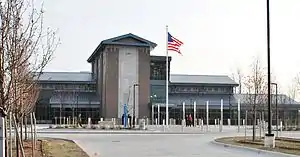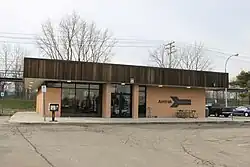John D. Dingell Transit Center
The John D. Dingell Transit Center, also known as the Dearborn Transit Center, is an intermodal transit station in Dearborn, Michigan. It is served by Amtrak's Wolverine line as well as Suburban Mobility Authority for Regional Transportation (SMART) buses. The station is named after former U.S. Representative John Dingell.
John D. Dingell Transit Center Dearborn, MI | ||||||||||||||||||
|---|---|---|---|---|---|---|---|---|---|---|---|---|---|---|---|---|---|---|
 The John D. Dingell Transit Center, one week after opening in Dearborn, Michigan | ||||||||||||||||||
| General information | ||||||||||||||||||
| Location | 21201 Michigan Avenue Dearborn, Michigan United States | |||||||||||||||||
| Coordinates | 42°18′25″N 83°14′05″W | |||||||||||||||||
| Owned by | City of Dearborn | |||||||||||||||||
| Line(s) | MDOT Michigan Line | |||||||||||||||||
| Platforms | 2 side platforms | |||||||||||||||||
| Tracks | 2 | |||||||||||||||||
| Connections | ||||||||||||||||||
| Construction | ||||||||||||||||||
| Parking | Yes; free | |||||||||||||||||
| Accessible | Yes | |||||||||||||||||
| Other information | ||||||||||||||||||
| Station code | Amtrak: DER | |||||||||||||||||
| History | ||||||||||||||||||
| Opened | December 9, 2014 | |||||||||||||||||
| Passengers | ||||||||||||||||||
| FY 2022 | 52,850[1] (Amtrak) | |||||||||||||||||
| Services | ||||||||||||||||||
| ||||||||||||||||||
| ||||||||||||||||||
Description
The station is located at 21201 Michigan Avenue (US Highway 12). The red brick and glass-faced structure includes a two-story waiting hall, which includes an elevated glass-enclosed pedestrian bridge which allows access to the south platform.[2] There is also a small retail space within the station.
History

The station was established in 1978 with the goal of Detroit's western suburban residents' access to passenger trains.[3] A station with a temporary structure opened July 30, 1978. A permanent station building opened on October 1, 1979, replacing the temporary structure. The station was built on property deeded to the city by the Ford Motor Company. The construction cost $348,000, which was split between Amtrak and the state of Michigan.[4] It was of an Amtrak standard station design.
On 19 August 2011, it was announced that the Federal Railroad Administration had released $28.2 million in funds from the ARRA economic stimulus package for the construction of a new intermodal station to replace the current building; the new facility would serve both intercity and commuter rail and include a new entrance to The Henry Ford museum complex adjacent to it.[5]
The new 16,000-square-foot station was officially opened for service on 10 December 2014, and consolidates the old station and the Greenfield Village station.[6]
A group called Pockets of Perception, made up of ten students of Dearborn senior high schools, created a 18-foot (5.5 m) by 20-foot (6.1 m) mosaic, titled "Transformations," on display in the station's lobby.[7]
Connections
- Suburban Mobility Authority for Regional Transportation; Routes 140, 160, 200, 210, 250, and FAST 261. [8] SMART's on-demand Flex service also serves the station and the surrounding area.
See also
Other stations that recently were demolished and replaced with a newer building.
References
- "Amtrak Fact Sheet, Fiscal Year 2022: State of Michigan" (PDF). Amtrak. June 2023. Retrieved August 30, 2023.
- Frezell, Michael. "John D. Dingell Transit Center grand opening ceremony in Dearborn". mi.gov/mdot. Michigan Department of Transportation. Retrieved 19 December 2014.
- "Amtrak lists Dearborn stops". Newspapers.com. Lansing State Journal. July 23, 1978. Retrieved 27 December 2021.
- "New Dearborn Station Opens, Serves Detroit's Growing Suburbs". Amtrak NEWS. 6 (12): 4. Nov 1979.
- "FRA obligates $28.2 million for new Dearborn train station". Progressive Railroading. 22 Aug 2011. Archived from the original on 2012-03-27. Retrieved 24 Aug 2011.
- Lawrence, Eric (10 December 2014). "First train pulls out of new Dearborn Amtrak station". The Detroit Free Press. Retrieved 11 December 2014.
- Lawrence, Eric D. "Mosaic sets tone for Dearborn transit center" (Archive). Detroit Free Press. October 25, 2014. Retrieved on August 6, 2015.
- "SMART Bus system map" (PDF). SMART. Retrieved 27 September 2021.
External links
![]() Media related to John D. Dingell Transit Center at Wikimedia Commons
Media related to John D. Dingell Transit Center at Wikimedia Commons
- Dearborn, MI – Amtrak
- Dearborn, MI – Station history at Great American Stations (Amtrak)
- Dearborn Amtrak Station (USA Rail Guide -- Train Web)